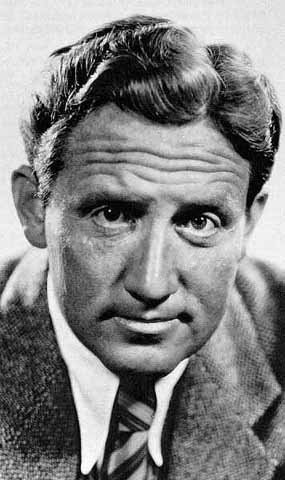UNITED STATES—Two substances had starring roles in the life of Spencer Tracy. They were coffee and booze. And there was a third substance, secret and largely unsuspected by the public that always hid in the shadows. Booze, first:
Spencer Tracy’s dance with booze is as illustrative as it was destructive and notorious. In James Curtis’ 1001 page biography, published in 2011, it’s almost impossible to find a single page where booze doesn’t figure. It is so frequent that it reaches the point of hilarity. You’ll be totally absorbed by profound insights on acting or a grueling production drama, and, there suddenly, demon pops up when you least expect it. Even though it’s no laughing matter, I laugh because it proves my thesis about the 1001 page book.
A doctor’s notes, made during a 1942 visit to Johns Hopkins offers a glimpse ofTracy’s drinking history. Ten years earlier “…he started out on periodic alcoholic bouts. Up to that time he had drank very little. After a play [movie] he would begin to celebrate, and would keep it up for a week or ten days. These periods of drinking would come about every eight months.” (Curtis, p. 464)
After four years of binges on the heels of completing a movie, Tracy “…decided that things could not go on that way, and for two years he did not drink anything. Then he fell and had another bout of drinking. After that we went for another four years without drinking.”
A new bout in 1942 that is what brought him to Johns Hopkins at the urging of Katherine Hepburn. He considered this bender, initiated by the belief that one drink was something he could handle and he couldn’t, was “utter folly.”
Thereafter, spaced out at lengthy intervals throughout the years, there would be benders, followed by the drive to stay sober. Some people need that sobering moment only once; they realize, hey, I’m going to die if I don’t stop. Or, I don’t want the grandkids to see me this way. They give up the booze and that’s it; others, like Tracy, return to that point several times. His life could be accurately described as long bouts of sobriety interrupted by brief periods of temporary drunkenness.
Not to say the man lacked awareness of the precariousness of his sobriety. In the 1950s, Tracy and his agent met director John Sturges to finalize “Bad Day at Black Rock.” They did it at Romanoff’s over martinis, as was customary with a star of Tracy’s magnitude. While Sturges and the agent sipped martinis, Spencer Tracy calmly drank coffee.
Years later, Sturges asked Tracy how long it had taken him to overcome the urge to drink. Tracy recalled that moment at Romanoff’s and said, ”You know, at that time I hadn’t had a drink for five years, but I wanted that martini and I looked at it with as much longing as the day I quit.” (Curtis, p. 603)
“That’s what the man lived with,” Sturges summed up.
By all accounts, the vice was vicious for Tracy. In his cups he attacked others with his hands and a vile tongue. He knew alcohol was especially harmful for him and yet he drank, often holed up alone in four-star hotels, missing events he’d promised to attend and standing up people. When you’ve got the awesome professional ethic of Spencer Tracy that has to hurt and kindle enormous guilt and shame.
The director Joseph Mankiewicz, who in 1941 produced “The Philadelphia Story” and knew both Hepburn and Tracy well, confirmed it to Tracy’s biographer. “Once you start thinking about Spence, it was his guilt,” Mankiewicz said. “But don’t forget that he would have a kind of proprietary sense about that guilt. I’ve known several like that—alcoholics… The kind Spence was… And they not only accept the guilt, they need the guilt to see them through this thing. Spence locked in a hotel room, going to the bathroom in his pants… every disgusting thing he did to himself. ‘I am beating myself up.’” (Curtis, p. 513)
Well, that’s what the man lived with. What do the rest of us live with? Unrealistically high expectations for totally perfect holy behavior. Where we keep butting our heads against a rule for how we should live and then experience repeated suffering, as a result, maybe we’d be advised to suspend the rule and take a refreshing step toward guiltlessness. But this clearly was not an option for Spencer Tracy.
To be continued…
Humorist Grady Miller is the author of “Lighten Up Now: The Grady Diet” (available on Amazon). He can be reached at grady.miller@canyon-news.com.






